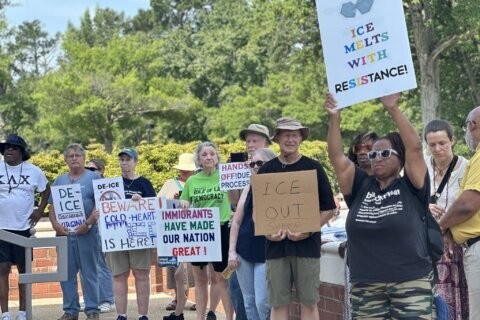This article was republished with permission from WTOP’s news partner InsideNoVa.com. Sign up for InsideNoVa.com’s free email subscription today.
This article was written by WTOP’s news partner InsideNoVa.com and republished with permission. Sign up for InsideNoVa.com’s free email subscription today.
The town of Quantico claims its former police chief was fired for not following an improvement plan rather than for enforcing state-mandated COVID-19 safety measures.
Meanwhile, lawyers for former Police Chief Mark McCoy are seeking court sanctions, saying the town is not complying with discovery ahead of next month’s planned jury trial.
McCoy is seeking $100,000 and alleging wrongful termination for his April 2020 firing.
McCoy’s lawsuit centers on the operation of barbershops at the start of the COVID-19 pandemic in March 2020 and the town’s response to orders for the businesses to close.
Recent filings and depositions of Mayor Kevin Brown and Town Attorney Olaun Simmons show the town is contending that any hesitation in enforcing safety measures was related to clarifying guidelines rather than skirting regulations.
Then-Gov. Ralph Northam’s first executive order causing sweeping shutdowns was issued March 12, 2020. A follow-up order, issued March 23, 2020, provided further guidance and closed a majority of businesses, including barbershops.
McCoy has claimed that the town’s police department received a complaint on March 31, 2020, that “several barbershops” in town were operating in violation of the order.
McCoy says he instructed an officer to provide a copy of the executive order to all the businesses, but Brown contacted the officer to say the town had “an arrangement” with its attorney that would allow the barbershops to remain open.
The town says Brown told the officer to “hold off on attempting to enforce the order against barbershops until the Town cleared up the intent of the Order.” Quantico has denied the existence of any agreement and said that as of March 31, 2020, its interpretation of the executive order allowed barbershops to remain open “as long as they limited patrons to 10 persons at a time and complied with social distancing guidelines.”
In court filings, the town has said that it changed its interpretation the following day and determined that barbershops must be closed. Officials indicated this change came after Simmons spoke with Prince William Commonwealth’s Attorney Amy Ashworth, Assistant Commonwealth’s Attorney Deborah Siegel and state Sen. Scott Surovell.
McCoy says he was “wrongfully terminated” as a “direct result” of his “refusal to refrain from enforcing” the executive order and his “refusal to the Mayor’s illegal agreement to defy the mandates.”
McCoy argues that the town is prohibited from firing him for reasons that “violate the public policy of the Commonwealth.” Essentially, the lawsuit says that because the alleged agreement between Brown and the barbershops violated Northam’s executive order, McCoy couldn’t legally be fired for violating it.
McCoy was suspended without pay for a week starting March 12, 2020, for allegedly refusing to meet with Brown about McCoy’s “poor performance and due to McCoy’s overall poor management of the police department.”
McCoy was placed on a performance improvement plan on March 20, 2020, the town says, showing that it had “identified significant performance deficiencies” before the executive order was issued.
The town’s concerns included installation of a security system purchased by McCoy at the police department without approval, failing to respond to Brown over several days, taking the town-owned patrol vehicle to his home and not showing up to a previously scheduled meeting, according to the town’s filings.
The Town Council heard McCoy’s appeal of his suspension on April 9, 2020, and, after a closed session, decided to fire him.
McCoy’s lawyers are seeking court intervention because they say the town has failed to respond to portions of discovery and provide dates for the deposition of Town Clerk Rita Frazier and because Brown’s deposition indicated the existence of documents that have not been turned over.
McCoy’s lawyers also say that town attorneys “improperly instructed” Brown and Simmons to not answer some questions related to the April 9 closed session.
The town contends it has waived attorney-client privilege only when it comes to discussion of the executive order, while McCoy’s attorneys say that once privilege is waived, the entire conversation is fair game.
Simmons testified in a deposition that the executive order was not discussed during the closed session, but McCoy’s attorneys say they are “not required to accept” Simmons’ “convenient, self-serving, unsupported and blanket assertion” that it wasn’t discussed.
“Defendant is attempting to cherry pick what testimony is and is not waived by them under the attorney/client privilege,” McCoy’s attorney’s wrote. “They have no such right.”
A hearing is scheduled for Friday in Prince William County Circuit Court on McCoy’s motion to compel the town to comply with discovery and answer questions in depositions.
A jury trial is scheduled Oct. 3-5.







